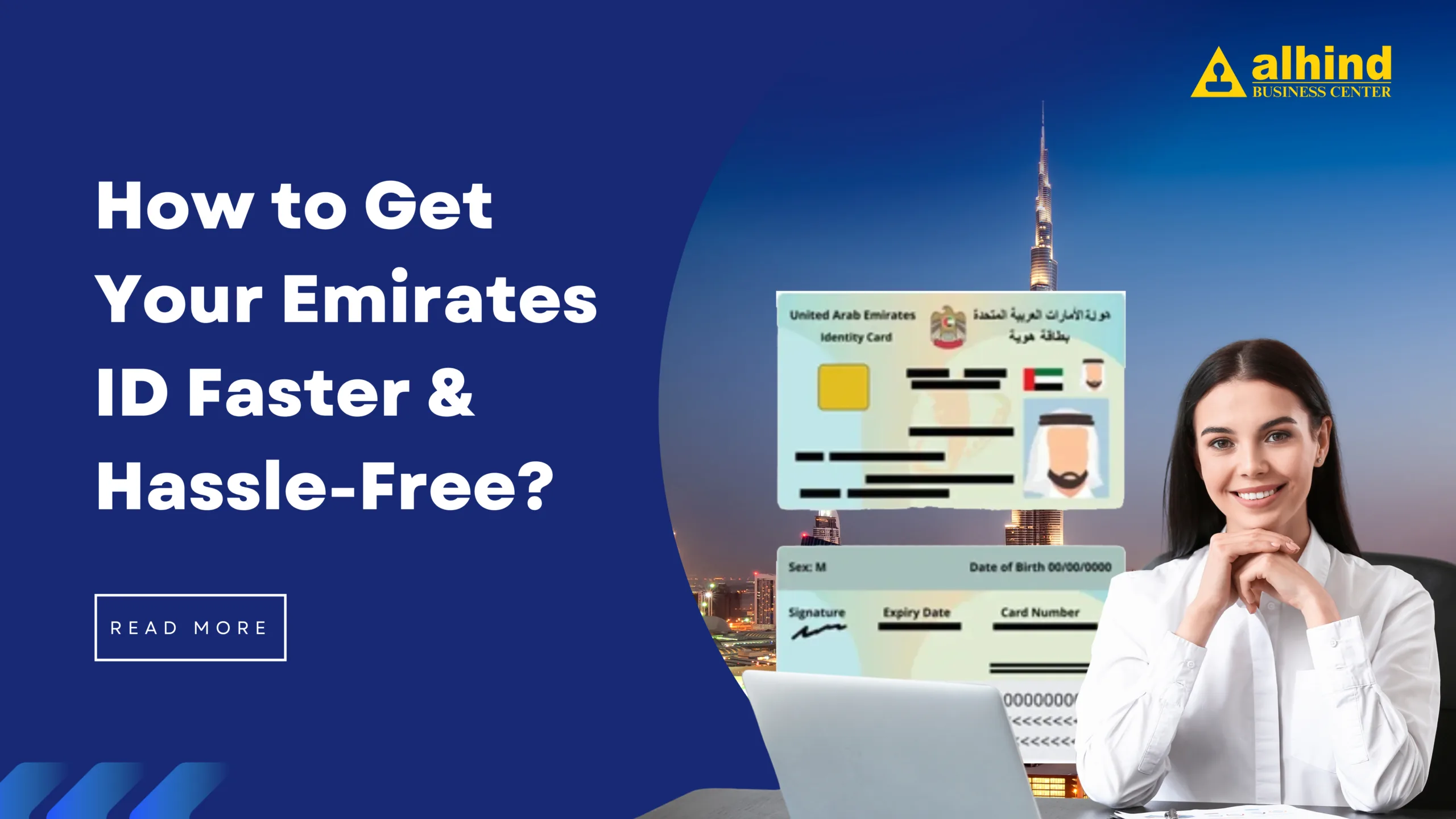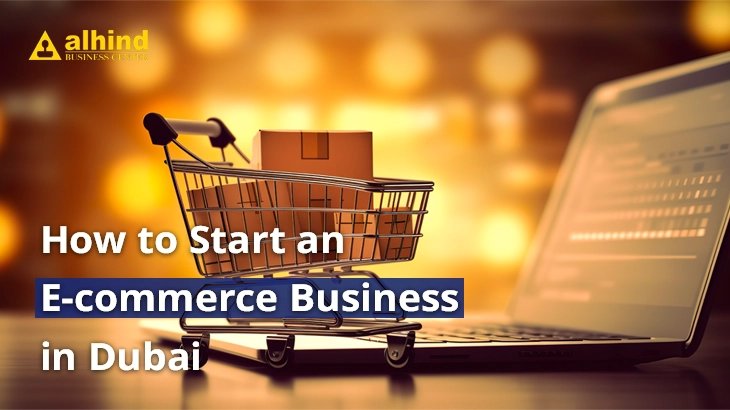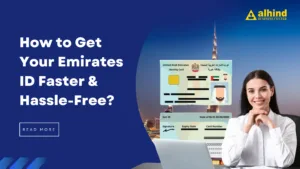Table of Contents
Dubai has become a top destination for e-commerce entrepreneurs and for good reason. With its strategic location between Europe, Asia, and Africa, world-class internet infrastructure, and government support for digital businesses, Dubai provides the ideal environment for launching and scaling an online store. Add in 100% foreign ownership, zero income tax, and access to a high-spending regional market, and it’s no surprise that thousands of global entrepreneurs are choosing Dubai to register their e-commerce businesses in 2025. Whether you’re selling fashion, electronics, or digital products, Dubai gives you the freedom, reach, and credibility to grow fast.
E-commerce Licensing in Dubai
So, you’re ready to launch your online store in Dubai; that’s a big step forward! But before you go live, there’s one essential requirement: securing the right e-commerce license. This isn’t just a piece of paper; it’s your legal authorization to operate an online business in the UAE, and it directly impacts your ability to open a bank account, register your website, comply with VAT rules, and build trust with customers and suppliers. At Alhind BC, we specialize in helping entrepreneurs from India, Pakistan, the UK, and around the world obtain their e-commerce licenses smoothly, correctly, and in as little as 1–2 days, all without the stress or confusion.
Understanding the Dubai E-commerce Landscape
Dubai’s e-commerce sector is rapidly evolving, driven by high internet usage, a youthful, digital-savvy population, and robust logistics. With growing interest from global brands and local entrepreneurs alike, launching an online business in the UAE by 2025 is a strategic move, though success requires navigating both opportunities and challenges.
Latest Market Trends and Opportunities
- Rising Consumer Demand: UAE e-commerce sales are expected to hit $15 billion by 2025 (Statista). Customers are actively shopping online for fashion, electronics, beauty, and health products.
- Mobile-First Shopping: Over 85% of online purchases happen via smartphones — meaning mobile-optimized stores have a huge advantage.
- Cross-Border Potential: Dubai acts as a gateway to the GCC, Africa, and South Asia. With the right setup, you can sell across 20+ countries.
- Support for Startups: Free zones like RAKEZ, SHAMS, and DMCC now offer e-commerce-specific licenses, virtual offices, and fast-track approvals, making entry easier than ever.
Key Challenges and How to Overcome Them
While the market is booming, new entrepreneurs often face a few common roadblocks, but with the right guidance, they’re easy to overcome.
| Challenge | How to overcome it |
|---|---|
| Choosing the Right License | Not all free zones allow e-commerce. Work with a trusted consultant to pick the correct activity code and jurisdiction (e.g., RAKEZ or SHAMS for online trading) |
| Opening a Business Bank Account | Banks often reject first-time applicants due to a lack of history. We help clients prepare strong documentation and connect with partner banks for higher approval rates. |
| VAT Registration & Compliance | VAT registration is mandatory if your annual turnover exceeds AED 375,000. We handle FTA registration, quarterly filings, and record-keeping. Additionally, corporate tax applies to businesses after license issuance. We’ll help you stay compliant with both VAT and corporate tax requirements. |
| Logistics & Fulfillment | Delays hurt customer trust. Partner with approved couriers like Aramex or Fetchr, or use fulfillment centers in JAFZA or DHL. |
| Renewals & PRO Tasks | Missing visa or license renewal dates leads to fines. Our PRO team tracks all deadlines and handles renewals on your behalf. |
Preliminary Steps: Laying the Foundation
Before diving into licenses and paperwork, smart entrepreneurs take two crucial steps: understanding the local market and choosing the right business model. In Dubai, consumer preferences, competition, and legal rules can make or break your e-commerce success, so guessing isn’t an option. At Alhind BC, we help founders validate their ideas with real market insights and select the ideal structure, whether it’s B2C, B2B, or dropshipping, ensuring your business is built on a solid foundation from day one.
Conducting Market Research with Local Insights
Dubai’s consumers are different from those in India, Europe, or the US. They’re affluent, time-conscious, and expect fast delivery, premium packaging, and seamless service.
Here’s what you need to know before launching:
- Top-Selling Categories: Fashion, beauty, electronics, baby products, and home wellness are leading the market.
- Customer Behavior: UAE shoppers prefer COD (Cash on Delivery) and easy returns. Your store must support both to gain trust.
- Competition Check: Use tools like Google Trends (set to UAE) or Noon/Amazon.ae to see what’s selling and at what price.
- Cultural Sensitivity: Avoid colors, imagery, or claims that may not align with local values, especially during Ramadan or National Day.
Choosing the Right Business Model: B2C, B2B, Dropshipping, and More
Your business model determines your license type, setup cost, and long-term potential. Here’s a quick guide:
| Model | What it is | Best for |
|---|---|---|
| B2C (Business-to-Consumer) | Selling directly to customers online | Fashion brands, skincare, digital products |
| B2B (Business-to-Business) | Selling in bulk to retailers or resellers | Wholesalers, distributors |
| Dropshipping | No inventory supplier ships directly | Low-budget startups |
| Marketplace | Hosting multiple sellers (like Amazon) | Tech platforms |
| Subscription Box | Monthly delivery of curated products | Niche lifestyle brands |
Important Note: Not all free zones allow dropshipping or cross-border e-commerce. For example, some require a local warehouse, which can increase costs.
How Alhind BC Helps: We’ll match your business model with the ideal free zone and license to ensure full compliance and prevent future rejections. With expertise across all major UAE free zones, we guide you to the most flexible, cost-effective, and e-commerce-friendly options tailored to your needs.
Jurisdiction and Location Choices
When starting an e-commerce business in Dubai, one of the most important decisions you’ll make is where to register your company: Free Zone or Mainland?
This choice affects your costs, market access, licensing rules, and even your ability to open a bank account. At Alhind BC, we guide hundreds of entrepreneurs through this decision every year, helping them pick the option that aligns with their goals, not just the cheapest upfront cost. Let’s break down the real differences so you can choose with confidence.
Free Zone vs Mainland: Key Differences and Which to Choose
Free Zone (e.g., RAKEZ, SHAMS, DMCC)
Ideal for: Online businesses, foreign entrepreneurs, e-commerce, dropshipping, and those who don’t need a physical store.
- 100% foreign ownership – No need for a local sponsor
- Tax-free income – No corporate or personal tax
- Fast setup – Can be completed in 3–5 days, often 100% online
- Cost-effective – Lower fees and flexible office options (virtual/flexi-desk)
- Limitation: Cannot trade directly in the local UAE market without a distributor
Best for: Founders based outside the UAE who want to launch fast, stay compliant, and sell internationally.
Mainland (DED License)
Ideal for: Businesses planning to operate physically in Dubai, open a store, or trade directly with local suppliers and customers.
- 100% ownership now allowed in most sectors (no agent needed)
- Full market access – Sell directly to UAE customers and government entities
- Greater credibility – Preferred by some banks and partners
- Higher cost & longer setup – Requires more documentation and often a physical office
Best for: Entrepreneurs who plan to live in Dubai, open a showroom, or work with local distributors.
Company Registration Process
Getting your e-commerce business legally registered in Dubai doesn’t have to be confusing. At Alhind BC, we’ve helped hundreds of entrepreneurs from first-time founders in India to experienced sellers in the UK set up their companies quickly and correctly.
Naming Your Business: Legal Considerations and Best Practices
Your company name is more than just a brand; it’s part of your legal identity in the UAE. Here’s what you need to know:
Structure: Your name will follow this format:
[Your Brand] + [Activity] + [Free Zone or LLC]
Example: DesertCart Trading FZE (FZE = Free Zone Entity)
Avoid restricted words:
Words like “Bank,” “Insurance,” “Emirates,” “International,” or “Consulting” may require extra approvals or aren’t allowed for e-commerce.
Keep it simple and professional:
Use your actual brand name. Avoid symbols, numbers, or slang.
Check availability early:
We’ll verify your preferred name with the free zone authority (like RAKEZ or SHAMS) before you apply.
Step-by-Step: Business Registration Process in Dubai
Here’s how we help you register your company in simple, real-world steps:
Step 1: Choose Your Business Activity
We’ll help you select the correct license type (e.g., E-commerce Trading) and ensure it matches your business model (like dropshipping or online retail).
Step 2: Pick Your Jurisdiction
Based on your goals, we’ll recommend the best fit — RAKEZ, SHAMS, DMCC, or Mainland and explain why.
Step 3: Submit Name & Get Approval
We send your name options to the free zone. Approval usually takes 6–24 hours.
Step 4: Sign the Application & Pay Fees
You’ll sign digital forms (no need to be in Dubai). We handle all submissions and payments securely.
Step 5: Receive Your Trade License
Within 3–5 days, your license will be issued. You’ll get a digital copy instantly, ready to open a bank account or launch your website.
Step 6: Get Your MOA & Certificate of Incorporation
These official documents confirm your company’s legal status. We’ll deliver them to you by email (and courier, if needed).
Document Requirements Checklist
Here’s what you’ll need to apply: all can be submitted digitally (no need to travel):
| Documents | Details |
|---|---|
| Passport Copy | Clear scan of the first and last page (valid for at least 6 months) |
| Passport-Sized Photo | White background, professional look |
| Proof of Address | Utility bill or bank statement (not older than 3 months) |
| Business Plan (if required) | Brief description of your e-commerce model (we help draft it) |
| Visa Copy (if resident) | Only if you already live in the UAE |
Application Steps: Fees, Timeline, and Tips
Here’s how we help you get your e-commerce license — fast and hassle-free.
Step 1: Choose Your Free Zone
We recommend free zones that offer low cost, full online setup, and 100% ownership — ideal for most e-commerce businesses. Our experts will guide you to the best option based on your needs.
Step 2: Finalize Business Name
We check availability and reserve your name within 24 hours.
Step 3: Submit Application
We fill out all forms, attach your documents, and submit them to the free zone authority.
Step 4: Pay the Fees
You’ll pay one clear package fee — no hidden charges. We accept secure online payment.
Step 5: Receive Your License
In 3–5 working days, you’ll get:
- Trade License (PDF)
- Certificate of Incorporation
- MOA (Memorandum of Association)
Conclusion
Starting an e-commerce business in Dubai is one of the smartest moves an entrepreneur can make in 2025. With its strategic location, tax advantages, and booming digital market, Dubai offers unmatched opportunities for online businesses to grow and scale. From choosing the right license and business model to navigating free zone options and completing registration, every step lays the foundation for long-term success. At Alhind BC, we make this journey simple, fast, and stress-free, helping clients from India, Pakistan, the UK, and beyond launch their e-commerce ventures in just 3–5 days with full compliance and ongoing support. Your dream business isn’t far away; it starts with the right guidance and a single step forward.
Frequently Asked Questions (FAQs)
How long does it take to register an e-commerce company in Dubai?
With the right support, you can get your e-commerce business registered in just 3–5 days. Some service providers, like Alhind BC, even offer license issuance in 1–2 days with full online processing, no need to travel to Dubai during setup.
I’m from India/UK/Pakistan – can I fully own my e-commerce business in Dubai?
Yes, absolutely. Under recent UAE laws, 100% foreign ownership is allowed for e-commerce businesses, especially if you set up in a free zone like RAKEZ, SHAMS, or DMCC. You won’t need a local sponsor or agent, making it easy for international entrepreneurs to launch and manage their business remotely.
Which is better for my online store: Free Zone or Mainland?
It depends on your goals:
- Choose a Free Zone (e.g., RAKEZ, SHAMS) if you want 100% ownership, tax benefits, low cost, and are selling internationally.
- Choose Mainland if you plan to sell directly in the UAE market, open a physical store, or work with local distributors. Free zones are usually the best fit for most online entrepreneurs.
Can I run a dropshipping business in Dubai?
Yes, but not all free zones allow it. You must select a jurisdiction that specifically permits e-commerce and dropshipping activities. For example, RAKEZ and SHAMS offer licenses tailored for online trading and cross-border e-commerce, making them ideal for dropshippers.
Do I need a physical office in Dubai for my e-commerce business?
No, you don’t. Most free zones offer virtual office packages or flexi-desk options, which fulfill the legal requirement for a business address without needing to rent physical space—perfect for remote entrepreneurs.
Will I need to pay taxes on my e-commerce business in Dubai?
There is no personal or corporate income tax in most free zones. However, VAT registration is mandatory if your annual turnover exceeds AED 375,000. Corporate tax (9%) applies if your profits exceed AED 375,000 per year. Professional support can help you stay compliant with FTA rules and file returns correctly.
Can I open a business bank account remotely?
While some banks require in-person visits, many now accept remote applications—especially if you have a strong business case and complete documentation. Experts like Alhind BC help clients prepare winning applications and connect with partner banks to increase approval chances.


















